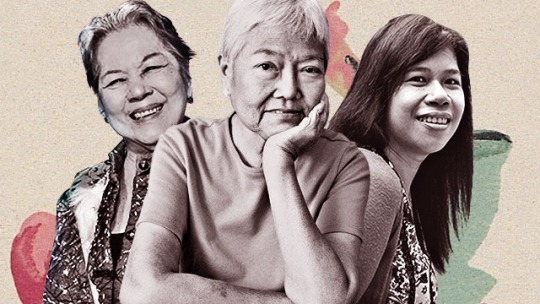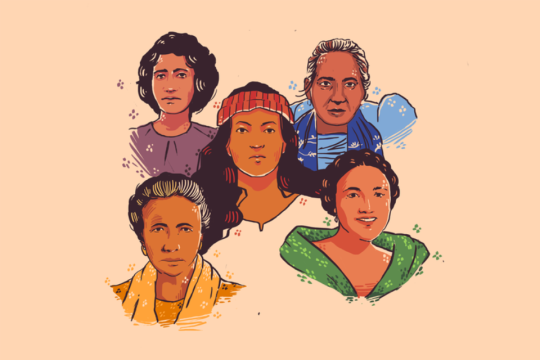#BuklodNgKababihan
Text
Kung mas lalo kang humirap ngayon, sino ang sisisihin mo?

I’m not a fan of Filipino noon shows, but this episode really stuck with me. Vice Ganda here, rebukes Anne Curtis’ and a contestant’s argument that the poor remain poor because they are lazy. For him, especially as someone with the rags to riches narrative, his success does not discredit the hard work of farmers who are cheated by unfair pricing and monopoly in agribusiness. He also shared that in the past, he used to think the same way as well. However, he now realized that it is the people with leverage who are constraining others. Injustice and inequity is still prevalent as one can observe in the school setting, for example. The rich are typically labeled the brightest minds for they can afford private tutors and have access to the internet and academics materials. Although there is a right to education, many are still at a disadvantage due to the high cost of education.

WHAT. A. DRAG. I know, but I wanted to use this as an example in order for us to better understand the habitus of two different sides of the same coin. What has led me to my current disposition? What has led the Women of Buklod to theirs?
May naibinhi nga ba ang Binhi sa akin?
When I first signed up for LB01, I did not expect that I would be able to learn more than I already knew. Being a female, I have always thought that I’ve had a clear picture of the plight of women. I was, of course, proven wrong. One’s mere similarity with another does not immediately entail a clear understanding of another’s situation.
The women of Buklod ng Kababaihan were former sex workers in Olongapo. Sex tourism was prominent in their city, especially during the time of the U.S. military in the Subic Bay Naval Base. Its closure after the American Occupation, however, did not abolish the bars and clubs that have made their niche. Instead, only the clientele of the so-called Sin City changed.
Ate Jen (not real name), Ate Apple (not real name), to name a few, were strong women. Behind their smiles, however, are lingering stories of pain and abuse. Belonging mostly from the marginalized sectors, these women were the breadwinner in the family. Some of them were even sold by Mothers to the sex trafficking ring or were molested by their family members. Most of them, due to the violence and harassment experienced in their families, ran away. This is where the women were unfortunately reeled into sex work. Ate Apple, one of the oldest in the group, gave birth to a half-American who will never get to know his father. Ate Jen, the Buklod member I got to talk a lot with, shared that she made a round with all the abuses one could ever think about. Due to lacking educational attainment, Ate Jen and many others were unable to land on jobs that could satisfy the needs of everyone in the family. For Ate Jen, specifically, it meant going home and not being able to feed the mouths of her 6 children, her relatives, and her husband. Thus, she was pushed into the world of an “entertainer”. For some, however, sex work was a choice. It was a chance to explore their sexuality whilst earning income. Unfortunately, this entailed contracting sexually transmitted diseases, unfair treatment in the workplace, and abuse.
Raised by Catholic parents, Ate Jen was a devout Catholic. Thus, when she was finally able to liberate herself from the horrors of the growing sex industry, she vowed to give back to society. Along with many others, Ate Jen volunteers in the programs of Buklod ng Kababaihan in order to support sex workers and to help their families as well. Buklod ng Kababihan wants to highlight that there are other opportunities for women to earn money. At the same time, they understand the reasons for many to continue sex work. Thus, they want to protect the rights of sex workers as well. Roughly translated, I remember Ate Joy telling us that before she was aided by others, she lived a life in submission. Now, although barely scraping by, Ate Jen says she is the happiest she can ever be now that she spends her time with her children, works an honest job as a janitress, and helps other women through rallying and working for Buklod.
Pushed by their harsh environment to be tough and independent, these women are the epitome of true grit. They have learned their ways in order to survive. Cunning, bold, fearless – such words barely justify the strength of the women of Buklod. Seeing them laugh and stand proud, it makes one forget that once upon a time, these women felt that at a point in their lives, they were hopeless. With no authority figure to guide them and barely any support felt as a child, these women were forced into maturity at such a young age. This makes me ponder about the great class disparity here in the Philippines. Every night for nineteen years, I came home to loving parents and a hearty meal. Unknowingly, on the other side of the wall, there were families of a dozen sharing a cup of noodles to warm themselves as they slept at streets, with lampposts as their only light.
I have always labeled myself as belonging to the middle class or the comfortable living standard. I never appreciated what we had because I always thought that it was not enough. We weren’t rich. We just had enough to feed our mouths and pay our tuition. My parents grew up in poor families. My mom used to sell ice candy and banana cue when she was twelve. My father was a caretaker of houses every summer during his childhood to help his parents. Thus, I was shaped to think that I needed to work hard so that I may be able to repay my parents. Although my parents did a good job of alleviating our standard of living, some of my relatives weren’t fortunate enough. Thus, I was encouraged to study hard. Even my drive as a Management Engineering student is stirred by my hopes of a better future not only for my children but for my relatives as well. Although my parents grew up with parents of the working-class, perhaps the reason they have never raised a hand on my sister and I, or that they value education and hard worker, no matter what the cost, is attributed to their upbringing. Although I never got the chance to be close with my grandparents before their passing, I heard of their stories. They might be tough at times, but they worked hard for the future of my parents. Thus, I believe that my profound interest in socioeconomic issues or politics, in academics, and my self-direction and autonomy is a product of the structured and structuring structure of my habitus.
Although at some point, some women of Buklod shared the same story as my parents, my parents had different social capital. They were influenced by scholars in the family. My granddads were engineers and my grandma was a teacher. They were low in economic capital, yes, but the similarity in their demand and resource was offset by the great force backed by the environment. For my parents, they valued education and they wanted to be part of the corporate world or at least to move up from being blue-collared workers. Ate Jen and Ate Apple didn’t have that kind of support. In their respective fields, actors such as their families and friends played a role in their transformation, in the context of my parents, or preservation, in the situation of the sex workers, of their social hierarchy. Thus, my current disposition is brought about by the earned privilege I have as bestowed by my parents. For many others, however, the life they live today as a combination of the life they were born to and of the oppressive system of our society.
In the end, it all boils down to us as members of our society. Do we live for ourselves, or do we live for the greater good? If we all take our time to reflect and see the consequences of our actions, we will soon be able to realize that we are often clouded by notions of greed and thirst for greatness. When we soon stop ourselves from clinging to be the best among the rest, that is when we soon see that there need not be the best. What we need as a society is to be able to cater to each and every one. Perhaps, if we are open to such concept, then maybe the term marginalized will be nonexistent as well. In a documentary I have watched entitled “Walang Rape sa Bontoc”, I realized that if we are able to strengthen our ideals of equity and respect, then concepts such as the poor, violence, rape, abuse, discrimination, and many more, would never have been created or would have no use for at all. It is a long journey to such dream. Too idealistic would be a phrase for many. However, I do believe that no matter what the cost or no matter how long it takes, if we all see through our materialistic desires, we may be able to find ourselves as one with everybody else. This is what Binhi has made me see. I never thought that I’d ever quote Vice Ganda or use his philosophy for any circumstance at all, but truth be told, it is in our hands as people of privilege to help others to stand and grow as well.

2 notes
·
View notes